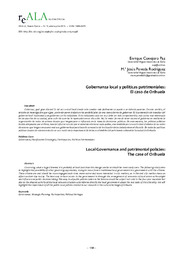Please use this identifier to cite or link to this item:
https://hdl.handle.net/11000/34235Full metadata record
| DC Field | Value | Language |
|---|---|---|
| dc.contributor.author | Conejero Paz, Enrique | - |
| dc.contributor.author | Poveda Rodríguez, M.ª Jesús | - |
| dc.contributor.other | Departamentos de la UMH::Ciencias Sociales y Humanas | es_ES |
| dc.date.accessioned | 2025-01-09T09:14:16Z | - |
| dc.date.available | 2025-01-09T09:14:16Z | - |
| dc.date.created | 2016-06 | - |
| dc.identifier.citation | REALA, Nueva Época – N. 5, enero-junio 2016 | es_ES |
| dc.identifier.issn | 1989-8975 | - |
| dc.identifier.uri | https://hdl.handle.net/11000/34235 | - |
| dc.description.abstract | Gobernar, ¡qué gran dilema! Es tal vez a nivel local donde este cambio más fácilmente se puede o se debería apreciar. En este sentido, el estudio de investigación que sigue, pretende poner énfasis en las posibilidades de una nueva forma de gobernar. Es la pretensión de transitar del gobierno local tradicional a un gobierno con la ciudadanía. Esta ciudadanía cada vez es y debe ser más comprometida, más activa más interesada en los asuntos de su ciudad, pues a fin de cuentas le repercuten en su día a día. Así, la mejor forma de tener acceso al gobierno es mediante la organización de redes de actores locales que tengan peso e influencia en la toma de decisiones públicas. De esta manera, las políticas públicas locales adoptadas por el Pleno, han de influirse no sólo por el mandato electoral cada 4 años, sino también por una actividad dinámica de las redes de actores que tengan un acceso real a su gobierno local para hacerlo conocedor de la situación de la ciudadanía en el día a día. De todas las políticas públicas locales de nuestro estudio se va a incidir en la importancia de éstas en el ámbito del patrimonio cultural de la ciudad de Orihuela. | es_ES |
| dc.description.abstract | Governing, what a huge dilemma! It is probably at local level that this change can be or should be more easily seen. The following study aims to highlight the possibility of other governing approaches, trying to move from a traditional local government to a government with the citizens. These citizens are and should be more engaged each time, more active and more interested in city matters, as in the end city matters have an effect on their day-to-day. The best way to have access to the government is through the arrangement of networks of local actors with weight and influence on public decision taking. This way, local public policies taken in the Session should be subject not only to the four-year mandate but also to the dinamic activity of the local network of actors who informs directly the local government about the real state of the citienship. We will highlight the importance of all the public local policies studied in our research in the cultural heritage of Orihuela. | es_ES |
| dc.format | application/pdf | es_ES |
| dc.format.extent | 15 | es_ES |
| dc.language.iso | spa | es_ES |
| dc.publisher | Instituto Nacional de Administración Pública | es_ES |
| dc.rights | info:eu-repo/semantics/openAccess | es_ES |
| dc.rights.uri | http://creativecommons.org/licenses/by-nc-nd/4.0/ | * |
| dc.subject | Gobernanza | es_ES |
| dc.subject | Planificación Estratégica | es_ES |
| dc.subject | Participación | es_ES |
| dc.subject | Políticas Patrimoniales | es_ES |
| dc.subject | Governance | es_ES |
| dc.subject | Strategic Planning | es_ES |
| dc.subject | Participation | es_ES |
| dc.subject | Political Heritage | es_ES |
| dc.subject.other | CDU::3 - Ciencias sociales | es_ES |
| dc.title | Gobernanza local y políticas patrimoniales: El caso de Orihuela | es_ES |
| dc.title.alternative | Local Governance and patrimonial policies: The case of Orihuela | es_ES |
| dc.type | info:eu-repo/semantics/article | es_ES |
| dc.relation.publisherversion | https://doi.org/10.24965/reala.v0i5.10348 | es_ES |

View/Open:
10348-Texto del artículo-14217-2-10-20180313 (1).pdf
834,39 kB
Adobe PDF
Share:
.png)
